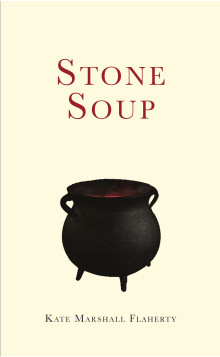Stone Soup
Stone Soup is inspired by the poetic folktale in which three travelers enter a village and open the minds and hearts of the townspeople by inviting them to contribute whatever they can to a simple meal that begins with a stone: a gesture that dispels fear, forges connections and nourishes the entire community. Similarly, the cauldron of these inviting poems effortlessly blends ingredients both earthy and spiritual, jaunty and tender, compassionate and ecstatic. The poems encompass generations of family and friends and embrace a wide spectrum of cultures and traditions to reveal heights and depths of our common humanity from fresh and surprising angles of vision.
About The Author
Reviews of this Book
Review by Katherine L. Gordon
From a butter-cream background, an ancient iron pot entices. It has the four legs: earth, air, water and fire, grounding the circle of the cauldron of life. “Stone Soup” is the apt title of Kate Marshall Flaherty’s book, which is evocative of the cauldron of renewal as well as the brew of soul-food we all share in, each of us unique in the co-operative effort of trying to nourish each other through the rough, the ritual and the jubilation of days.
The stones of this book jangle through some of the poems, each of us assuredly carrying one, the rough edges, the smooth, even the cutting ones as in Kate’s poem, “Stone” … “every boy should have a stone in his pocket”. These are our contributions to the simmering pot of days: “to purge all that’s not best.” Little events stir profound observations in Kate, in language equally accessible and wondrous: “Like rough prayer beads/ to feed his family” from “Light Within”, and the amazing “alleluia!” in “Discovery … of The God Particle.” The spirituality of diverse cultures is gathered here, added to the collaborative soup, to nourish with insight, not division.
Kate begins with a “Dragon Fruit” section, the taste of the exotic and the plain blending harmoniously. She has a trick of catching the sublime in the simple, so much sacred in all human action. Much reverence glows in the references to Native lore, as in “Lost,” the “migwetch” (Ojibway for thank you) for all natural beauty. Her feelings, so palpably human, as in “Mosquitoes”, yet so connected to the deeper dimensions we sense. “Next of Kin” in the “Lost” section is a revolution of thoughts on our beginnings, our shared condition with all creatures. Fairy tales are here, reality is here, all blessed with a light Kate knows and transmits so easily to the surprised and enriched reader. Her language can leap from literate lovely to playful patois, and is entertaining and delightful–quite a mix.
As in the original folk-tale, the outcome is up to all those who enrich the meal. The reader will partake and be permeated with the revelation of “Stone Soup”.









